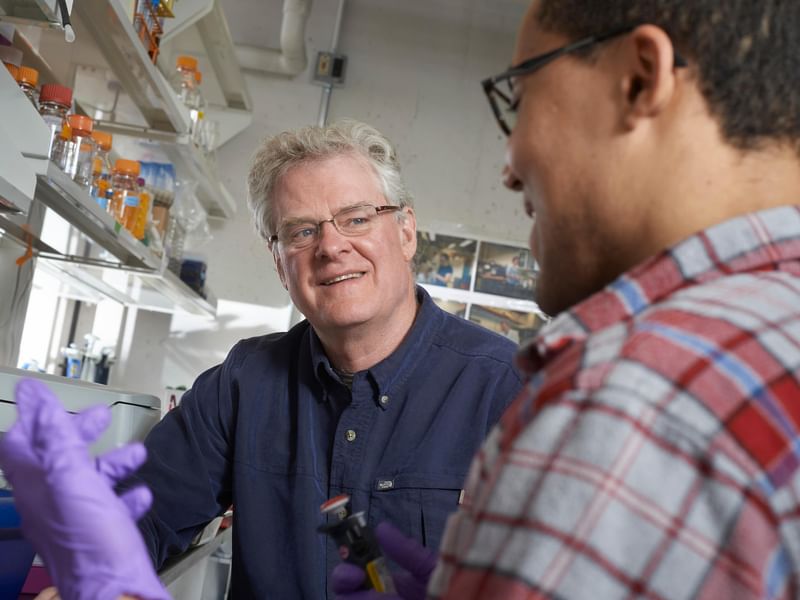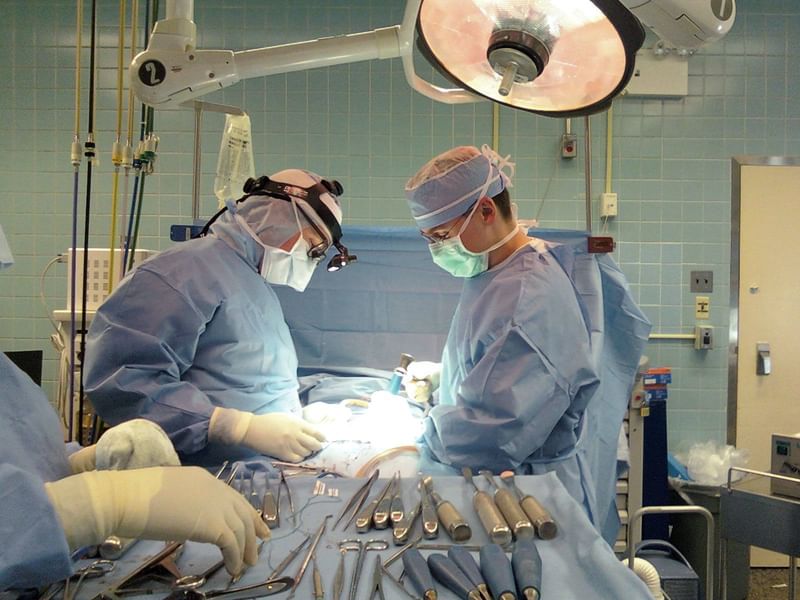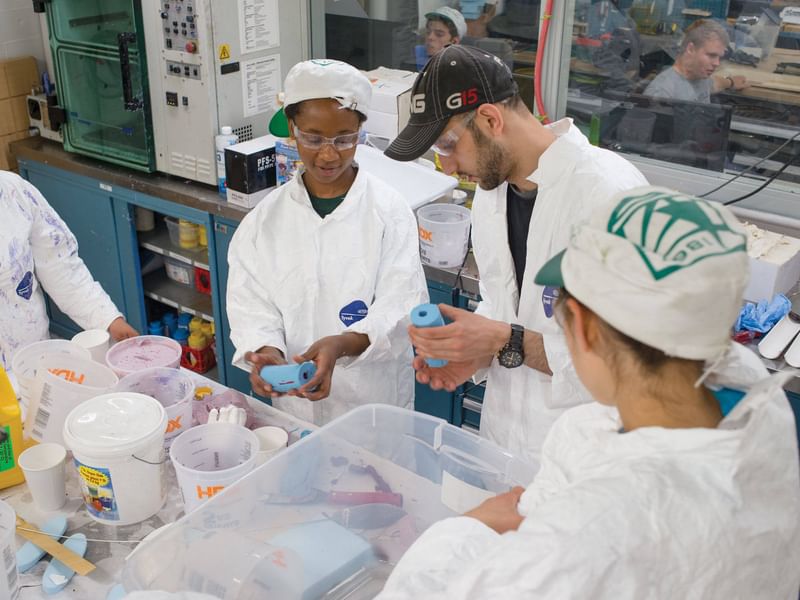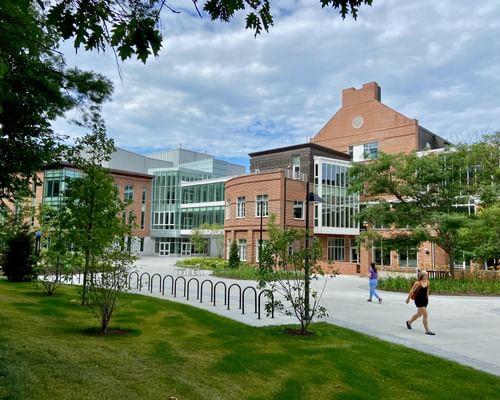On This Page
- Areas & Options
- Join Our Next Info Session
- Meet our PhD Students
- Prerequisites
- Coursework & Research Requirements
- First-Year Phase
- Program Plan
- Advisors & Annual Advisor Meeting
- Candidacy Phase
- Funding & Expenses
Dartmouth offers a diversity of concentrations with collaborative synergies between engineering disciplines. Graduate students are expected to propose a plan of study that supports their interests on a path unconstrained by disciplinary boundaries. At the time of graduation, PhD students may elect one of the six program areas to be reflected as a "concentration" on their transcript, upon verification by the Thayer registrar that they have satisfied the courses for that program area.
PhD students may elect to focus their coursework and research in one or more of the following program areas:

The industry research option is for:
"Students in our Innovation Program take classes at Tuck School of Business. They learn about contracts and patents. They attend conferences for entrepreneurs. They start building a professional network while they’re still students."
—Professor Doug Van Citters
Students interested in entrepreneurship can augment their PhD in engineering with the PhD Innovation Program (PhD-I), which adds courses in technology business practices and taking research discoveries to market. Students in this program meet all PhD requirements, including passing an oral qualifying exam and defending a thesis proposal, along with additional PhD-I requirements.

The MD-PhD combines a PhD in engineering sciences with an MD from Geisel School of Medicine at Dartmouth. Students must apply to the Geisel School as well as to Thayer, indicating their specific interests.
The Medical Physics Education Program is available to PhD students in engineering and the physical sciences. This program is accredited by the Commission on Accreditation of Medical Physics Education Programs (CAMPEP) and prepares graduates for a career in clinical medical physics.
Students can take advantage of Tuck School of Business, Magnuson Center for Entrepreneurship, and thought leaders and industry contacts within Dartmouth's extensive alumni network.
PhD students interested in business administration and management may obtain an Engineering Management Certificate by completing any three of the following courses in addition to their PhD requirements:
Candidates may enroll in other engineering management courses or, for additional tuition, courses offered by Tuck School of Business.

Interested PhD students may serve as teaching assistants for courses that have a problem session, tutorial, or laboratory component. In special cases, a student may participate in the design and development of a special topics course or laboratory exercises for a lecture course. Students become eligible for these positions following completion of the oral qualifying exam and the completion of ENGG 295: Undergraduate Teaching. More formalized teacher training, offered through the Dartmouth Center for the Advancement of Learning, is also available to engineering PhD students.

Learn how Dartmouth Engineering's graduate programs could be a great fit for you. Connect with faculty, staff, and students, and navigate the application process.
The foundation for doctoral engineering degree work is undergraduate preparation in science, mathematics, and engineering principles. Applicants must hold a bachelor's or master's degree to be considered for the program. Students admitted to the program who are not prepared to complete the first-year requirements are advised to enter the MS program and petition to be admitted to the PhD program. Students who have prior graduate training may be considered for advancement to candidacy after completing one or two terms of the first-year doctoral program.
The PhD program of study is developed based on each student's background and professional interests in consultation with the advisor and first-year advisory committee and must reflect the distribution shown below. Up to half these courses may be taken in science departments outside of engineering.
Students are required to take 8–10 courses in applied mathematics and engineering and participate in required seminars and workshops. Students with prior graduate credits may transfer up to half of their courses to count toward this requirement provided the courses were not used to satisfy bachelors degree requirements.
Please note: The information below reflects requirements, effective as of Fall 2024.
| COURSE TYPE | NUMBER OF REQUIRED COURSES | COURSES |
|---|---|---|
| Applied Mathematics | 2 courses | Choose at least two courses, from the following: ENGS 91: Numerical Methods in Computation Note: Other courses may be accepted towards the applied mathematics requirement with prior program plan approval. |
| Engineering Breadth | 2 courses | Choose at least two courses that demonstrate engineering breadth: Students can choose any graduate course leading to acquiring breadth of knowledge in engineering sciences. |
| Engineering Specialization | 4 courses | Choose at least four courses that demonstrate engineering specialization: Students can choose courses in the student's area of research to increase depth of knowledge and expertise. These courses should be selected in concert with the thesis advisor. |
Required Seminars & Workshops | 4 courses | Professional Skills Development ENGG 195: Seminar on Science, Technology & Society (28 sessions) |
In addition, PhD students also take on a multi-year research project, usually as part of a larger multidisciplinary project. Engineering research at Dartmouth reflects our belief that innovation happens at the intersection of disciplines and our emphasis on addressing areas of critical human need. PhD students work closely with their faculty advisor who is sponsoring their research to identify and further define their research focus.
All PhD students, upon matriculation, are required to attend a series of workshops in ethics and sign a statement that they agree to abide by the honor principles established by Dartmouth. See Graduate Academic and Conduct Regulations for a full statement of academic honor.
Students in the PhD program are expected to spend at least nine terms in residence, three of which will take place after successfully completing the oral qualifying examination. Students who are registered and enrolled in two or more courses per term(or ENGG 298) are considered full-time and as being "in residence." Students typically take approximately four to five years to complete the requirements for the PhD.
The PhD program can also be undertaken part-time: students interested in this option should contact the Senior Associate Dean for Research and Graduate Education.
See PhD Innovation Program Requirements for details.
During the first year of the PhD program, you will prepare for formal candidacy by taking courses and participating in faculty-directed research projects. Review the Typical Thayer PhD Process (.pdf). Each student works with a faculty advisor and two additional Thayer faculty members to develop a first-year program of study, which the student submits to the Thayer Registrar during the first week of the term.
A typical first-year program of study includes:
During the student’s first term, the faculty helps the student develop a full program plan to fulfill the PhD requirements, which the student submits to the Thayer Registrar before the beginning of the second term. The remaining PhD coursework and research program plan includes the rest of the required engineering courses, plus participation in the following seminars and workshops:
Each PhD student has a faculty advisor who aids the student in developing their course of study, which is submitted to and approved by the Senior Associate Dean of Research and Graduate Programs during the student’s first term of residency. A student’s faculty advisor also supervises the student’s research and typically serves as chair of their thesis committee. Students can be co-advised by multiple faculty members.
At the end of each year, students meet with their faculty advisor to review grades, goals, achievements and future plans in research, formal coursework, and extracurricular activities. This meeting, and a corresponding written report, is required for every year that a student remains registered in the PhD program.
Following the first-year meeting, before the fall of second year, the advisor provides the Thayer Registrar a written report describing a student's annual performance.
Following a positive outcome of this first annual meeting, the student is expected to complete the oral qualifier examination before the end of the Fall term.
The second annual meeting should occur at the end of the student's second year, and a successful outcome of this would allow the student to progress to the PhD thesis proposal presentation before the end of the third year.
Students who are not progressing in a normal manner are transferred to the MS program with the understanding that they may later request to be reconsidered as PhD candidates.
Prior to advancement to candidacy, students must:
Once advanced to PhD candidacy, students work with a special advisory committee to make sure that all degree requirements are met.
| REQUIREMENT | DEFINITION | DEMONSTRATED BY |
|---|---|---|
| Technical proficiency | Knowledge of the principles and methods of engineering, applied science, and applied mathematics underlying the anticipated thesis research | Coursework and oral qualifying examination |
| Technical breadth | Knowledge of one or more areas outside of or secondary to the candidate’s main area of specialization | Program of study or presentation of research proposal or a project in an area outside the main area of specialization |
| Professional competence | Ability to develop resources in chosen area of research | ENGG 197: PhD Professional Workshops |
| Specialization & thesis proposal | Mastery of knowledge in the chosen area of research | Presentation of a thesis proposal and a program of study |
| Original research | Significant contribution to engineering knowledge combined with professional expertise in the chosen area of study | Presentation at a professional meeting, manuscript accepted for publication, dissertation, and oral defense |
The oral qualifying exam (ENGG 194), a set of questions put forward by an oral examination committee to the candidate, normally takes place before or during the fifth term of the student's program, or in exceptional circumstances early in the sixth term. The exam is open to the faculty, but not to the general public.
The committee tests the candidate's knowledge of principles and methods underlying the field in which advanced work is to be performed. The exam covers material selected by the candidate's advisor in consultation with the examining committee and includes coverage of mathematical techniques appropriate to the research area. The examination committee consists of four members—the Chair plus three Dartmouth faculty examiners, with at least two of the examiners from Thayer. A Thayer faculty member other than the student's advisor chairs the committee. This chair is assigned by the director of the MS and PhD programs.
The structure of the preparation for the exam is flexible. The student prepares a description of the planned exam, obtains approval of their advisor and two additional committee members, and then submits the proposal to the director of the MS and PhD programs. The director of the MS and PhD programs assigns a fourth committee member to serve as the Chair and approves the proposal. The student then submits the completed proposal to the Thayer Registrar (103 MacLean or registrar@thayer.dartmouth.edu) at least one month prior to the exam date.
The examination committee gives the student a pass, fail, or conditional pass result. Students who fail may retake the oral examination—one time only—within the following three months. Upon passage of the exam or fulfillment of the conditions of the conditional pass (before the assigned deadline) and with a letter of support from the advisor, the student is admitted to PhD candidacy pending a vote by the Thayer faculty.
The faculty advisor helps the candidate plan a demonstration of technical breadth, which is approved by the Senior Associate Dean of Research and Graduate Programs. The plan details one of the following options:
The candidate demonstrates professional competence by completing ENGG 197: PhD Professional Workshops, which is offered each Winter term by the faculty and outside experts. The workshop emphasizes skills in completing competitive proposals, business funding, patenting, research team organization, teaching, résumé and CV creation, and job search techniques. Each candidate completes a competitive research proposal or a business plan for critique by two expert referees selected from among faculty, outside experts, and/or corporate representatives. Candidates who have submitted a competitive research proposal to a funding agency or a business plan to a venture capitalist or financial institution prior to completing the workshop may petition to have the proposal or business plan fulfill this requirement.
The candidate demonstrates mastery of an area of specialization by writing and defending a thesis proposal within the first 18 months of candidacy. A thesis committee, approved by the director of the PhD program, advises the candidate on the proposed thesis research and administers the defense of the thesis proposal defense.
The PhD examination committee consists of a minimum of three full-time Dartmouth faculty members of which a minimum of two must be from Thayer (including the dissertation advisor) and an external member with a faculty equivalent research appointment outside of Dartmouth is optional, but not required. Note that although optional at the proposal stage, an external member is required for the final thesis committee and defense. The external member may participate in meetings in person or via video conference. The candidate's proposal—a presentation of the proposed thesis research—explains the scope and importance of the proposed research and plans for its completion. The defense presentation should be understandable, at least in a general way, to students and faculty not in the subject area.
Two weeks before the defense, candidates must:
Students who do not pass may be permitted to present the proposal again—one time only—within the following three months.
Candidates demonstrate their significant contribution to engineering knowledge and professional expertise in the chosen area of study by performing original research. The PhD examination committee consists of a minimum of three full-time Dartmouth faculty members of which a minimum of two must be from Thayer (including the dissertation advisor) and an external member with a faculty equivalent research appointment outside of Dartmouth. The external member may participate in meetings in person or via video conference. The research is reviewed through all of the following means:
A PDF of the final dissertation, including a cover sheet signed by the thesis committee, must be submitted to the Thayer Registrar for archiving. Copyright to the dissertation is held by the Trustees of Dartmouth College.
PhD students typically enter with full support from either a Graduate Research Assistantship (GRA) or an external fellowship.
Tuition for the academic year is covered by a Graduate Research Assistantship (GRA), which includes instruction, insurance coverage, use of instructional facilities, and healthcare service through the College infirmary.
Students admitted with a GRA receive a monthly stipend. The stipend amount for the 2024-2025 academic year is $3,916.67 per month ($47,000 per year).
Students who obtain an external fellowship that fully funds their PhD—such as from NSF, DOD, NASA, or DOE—will receive an additional yearly stipend from Thayer for the duration of their PhD.
PhD students typically enter with full funding support from either a GRA or an external fellowship. GRAs, funded by contract research, are available to well-qualified candidates enrolled in degree programs with thesis requirements. Most PhD funding includes full tuition cost coverage plus a monthly stipend. GRAs also include health care coverage for those who opt for college insurance. As with all graduate students, Thayer's commitment to financial assistance will continue as long as a student remains in good academic standing and is making normal progress in fulfilling degree requirements.
Dartmouth is currently in the process of implementing GRA updates associated with the Dartmouth and Gold-UE Collective Bargaining Agreement. Additional details will be provided as they become available.
There are a number of scholarships, fellowships, and grants offering financial awards that are available to PhD graduate students.